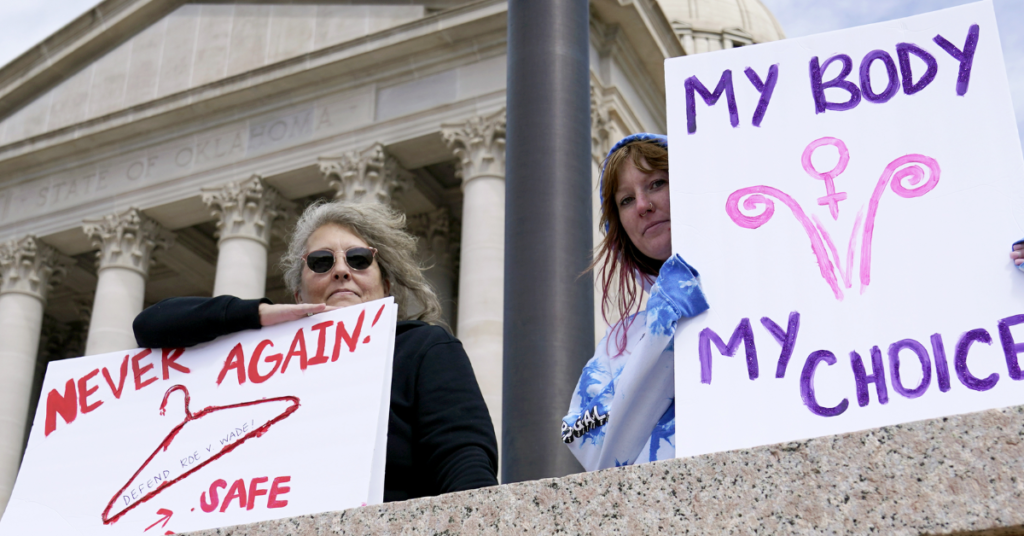OKLAHOMA CITY – In a significant move, a bipartisan group of Oklahoma state senators has voted down a controversial bill that would have imposed the death penalty on women who seek an abortion. Despite this setback, supporters of the bill, known as abolitionists, are vowing to continue their fight to eliminate abortion in the state completely.
On Wednesday, the Senate Judiciary Committee voted against Senate Bill 456, which Senator Dusty Deevers introduced. The bill would have made it a criminal offence for women to undergo an abortion, with severe penalties, including life in prison or even the death penalty. It also sought to criminalize abortion-inducing drugs.
Senator Deevers, an ardent opponent of abortion, argued that the measure was necessary to protect the unborn, stating, “Children are being murdered in our state.” His push for the bill reflected Oklahoma’s long-standing anti-abortion stance, which includes some of the strictest laws in the nation. In fact, many clinics that once offered abortion services have already closed, forcing women seeking the procedure to travel to neighbouring states.
Since May 2022, there have been no recorded abortions in Oklahoma, as reported by the state Health Department in June. Deevers, however, expressed frustration with what he described as a “loophole” in the state’s current laws, claiming that women who undergo abortions are not being prosecuted. “Oklahoma has protected a class of murderers,” he said.

The bill’s supporters, including members of the Abolitionist Society of Tulsa, are undeterred by the defeat. Alan Maricle, a member of the society, declared, “We abolitionists will not rest until we have abolished human abortion in every form.”
While the bill was defeated, some lawmakers expressed concerns that it could resurface in the future. Cindy Nguyen, policy director for the ACLU of Oklahoma, warned that despite the bill’s defeat, similar bills are likely to return. “It tends to come up every year,” Nguyen said, reflecting the ongoing struggle over abortion rights in the state.
One of the major concerns raised during the committee meeting was how the bill would be enforced. Lawmakers questioned whether women who travel out of state for abortions would be subjected to pregnancy tests upon returning to Oklahoma. There were also discussions about potentially searching the mail of pregnant women for abortion-inducing drugs.
The introduction of such extreme abortion bills has already had a significant impact on Oklahoma’s healthcare system. Nguyen noted that the state’s strict abortion laws have led to a shortage of healthcare professionals willing to practice in Oklahoma, contributing to the creation of “maternity care deserts.” These deserts, where there is a lack of medical professionals and facilities, have made it harder for women to access necessary maternity and healthcare services.
Oklahoma’s strict abortion laws have also led to debates about potential ballot initiatives that could legalize abortion in the state. While supporters of abortion rights have discussed the possibility of a petition for a ballot initiative, they have not yet succeeded in circulating one that would gain the necessary support to be placed before voters.
Senator Shane Jett, a Republican member of the Senate Judiciary Committee, voted in favor of the bill and warned that the ongoing debate over abortion rights could lead to future ballot initiatives aimed at expanding access to abortion. “There are rumors that a pro-abortion ballot initiative may be coming,” he said.
Despite the defeat of Senate Bill 456, the battle over abortion rights in Oklahoma is far from over. Advocates on both sides of the issue continue to push for their agendas, and it seems likely that the issue will remain a prominent topic of debate in the state’s legislative halls.
Oklahoma is one of many states where the future of abortion rights hangs in the balance, with lawmakers introducing and debating various bills that seek to either expand or restrict access to the procedure. The state’s abortion laws have already been the subject of legal battles, and as the national conversation around abortion continues to evolve, Oklahoma lawmakers are expected to remain at the forefront of the debate.
Disclaimer: This article has been meticulously fact-checked by our team to ensure accuracy and uphold transparency. We strive to deliver trustworthy and dependable content to our readers.








